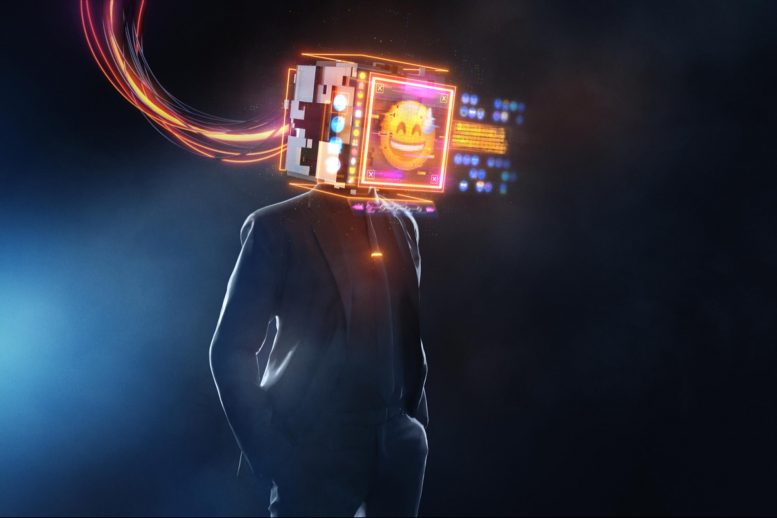
Humans are hard-wired to prefer happy endings and value the final few moments of the experience more highly than the rest of it.
- Our brains can’t always reliably evaluate experiences that unfold over time
- We tend to give disproportionate weight to the later part of an experience
- This can lead to bad decisions when choosing whether to repeat an experience
Humans are hard-wired to prefer experiences that end well, and the influence of previous experience declines the longer ago it happened. This means we can’t always trust that choices we make based on previous experience will serve our best interests in the future.
New research, published today (October 19, 2020) in The Journal of Neuroscience, has revealed that two different parts of the brain are activated, and compete with each other, when we make decisions based on past experience. They can cause us to overvalue experiences that end well despite starting badly, and undervalue experiences that end badly despite starting well — even if both are equally valuable overall.
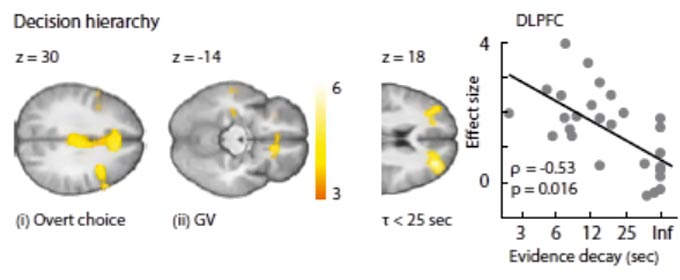
The overt choice was encoded in cingulate cortex, DLPFC and anterior insula (furthest left). The goal value was encoded in vmPFC (second left). The more suboptimal the decision-maker, the stronger the activity in the DLPFC (right). Credit: Vestergaard and Schultz, JNeurosci 2020
“When you’re deciding where to go for dinner, for example, you think about where you’ve had a good meal in the past. But your memory of whether that meal was good isn’t always reliable — our brain values the final few moments of the experience more highly than the rest of it,” said Dr. Martin Vestergaard, a researcher in the University of Cambridge’s Department of Physiology, Development and Neuroscience, who led the study.
“If we can’t control our in-built attraction to happy endings, then we can’t trust our choices to serve our best interests.”
The part of the brain called the amygdala works out the ‘objective value’ of an experience — the overall tastiness of a three-course meal, for example. Meanwhile, a brain region called the anterior insula was shown to ‘mark down’ our valuation of an experience if it gets gradually worse over time.
The further back in time an experience was, even if still quite recent, the less weight it carries in making the next decision. The researchers call it the ‘happy ending effect’: we tend to make decisions based on previous experiences that ended well, irrespective of how good the experiences were overall.
In the study, twenty-seven healthy male volunteers were asked to choose which of two pots of coins, viewed on-screen one at a time, had the greatest total value. They watched as coins of varying sizes — representing their value — fell from the pots in quick succession, while a brain scanner revealed what was happening in their brain using functional magnetic resonance imaging (fMRI). The task was repeated several times with different sequences of coins.
The volunteers systematically chose the wrong pot when the coins decreased in size towards the end of the sequence. This reveals that the brain was imposing a penalty on the whole sequence, irrespective of its total value, when the ending was not good. The effect varied from person to person, but only a few were able to ignore it entirely and make a completely rational decision.
The results verify theoretical models of decision-making, and challenge the popular belief that sub-optimal decision-making is rooted in the amygdala — the primitive part of our brain — whereas more astute reasoning happens in the more evolved part. They show that our evaluation of an extended experience is encoded robustly in the amygdala.
The attraction to the final moments of an experience is a fundamental mechanism in the human brain and important to be aware of, say the researchers. While there are clear advantages to paying attention to whether things are on an upward or downward trajectory, our judgments can fail us when we try to evaluate an overall experience afterward.
While bad decision-making in the context of eating out might not be disastrous, this inaccurate valuation in summarizing past events could lead to bad choices when using the information to make decisions for the longer-term — for example, deciding which politician to vote for.
“Our attraction to the quality of the final moment of an experience is exploited by politicians seeking re-election; they will always try to appear strong and successful towards the end of their time in office,” said Vestergaard. “If you fall for this trick, and disregard historical incompetence and failure, then you might end up re-electing an unfit politician.
“Sometimes it’s worth taking the time to stop and think. Taking a more analytical approach to complement your intuitive judgment can help ensure you’re making a rational decision.”
Reference: “Retrospective valuation of experienced outcome encoded in distinct reward representations in the anterior insula and amygdala” by Martin D. Vestergaard and Wolfram Schultz, 19 October 2020, The Journal of Neuroscience.
DOI: 10.1523/JNEUROSCI.2130-19.2020



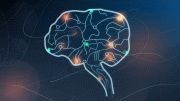
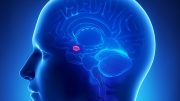
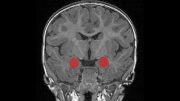



Does the author of this article realize that after an entire scientific article about the brain, the last two paragraphs are about politics instead of neurology? It seems as though the topic under consideration is “decision making and the effects of temporal distance from the end of the experience.” I gather the author misses the irony here, as science obviously has no power over politics, of being the writer responsible for the absorption and retention of this novel psychological data. Data, specifically regarding how we tend to over-value the last morsels of experience over the experience as a whole. So after priming You! the reader with data driven observations regarding the entirety of human history as far as our brain was involved in it, the author reveals hidden data, hidden variables, hidden bias. “Don’t trust your judgement about your experiences!” the author proclaims! “By the way you have an upcoming decision to make in the 2020 election.”
I’m at a loss. Did the author haphazardly inject politics into science to make a point? Knowing it would detract from the overall message about our decision making? Knowing full well theres no real data to support the political claim (if were to believe this is a new discovery about our brains, right?) Or did the author spend time researching this material, in order to better scribe it for us the readers to digest. After all, HOW you explain science is just as important as WHAT the science tells us.
Wait… my mistake! How you explain science, according to this article, is actually more influential in how we process scientific literature, than the data and theories that informed the literature.
The human brain has evolved for centuries. We are only JUST unlocking its inner mechanisms and secrets. I think a reference frame of 4 years of human history does this article justice in regards to how well it summarizes every decision made by humans in all of history. I might be focusing on the most recent current events; isn’t there a global pandemic right now? Maybe, we all can’t agree on how to handle Covid because we get new information that conflicts with the old info every single day? Maybe a pandemic is a more suitable reference to the importance of human decision making– but the author focused on the election.
I mean, even in the last 100 years (ish) there were TWO global wars, two pandemics, nuclear arms races, space races, internet, television, phones, airplanes, sex robots and self driving cars… an exponentially growing list of new technology that provides us even more information… maybe it would have been more worthwhile to discuss the modern age of technology and how it has dramatically changed how much information were even exposed to. Doesn’t THAT warrant a second thought in regards to decision making? Wouldn’t the last hundred years shape the minds and decisions of every generation of human in it? This could be the science that explains why millennials and baby boomers are like oil and water! Or why we haven’t quite figured out how to solve racism or sexism as a plague on society yet? Or even why theres such a large rift between the opposing political sides of the USA even after decades of activism? Certainly more than the last 5 political years right? Nah, focus on the election, focus on something that hasn’t even happened yet.
Don’t learn from the past, you’ll learn wrong anyway. like an author that misses their own point after writing it all out….
Keep your eyes on the election, it has far more bearing on our futures as a collective society than the entirety of human history before it…
Or, read this article again, and realize that in one journalistic cluster-*expletive*, the author has capture the very essence of whats wrong with humanity and what skills we must learn to grow out of it once and for all….
RIP 10/21/2020